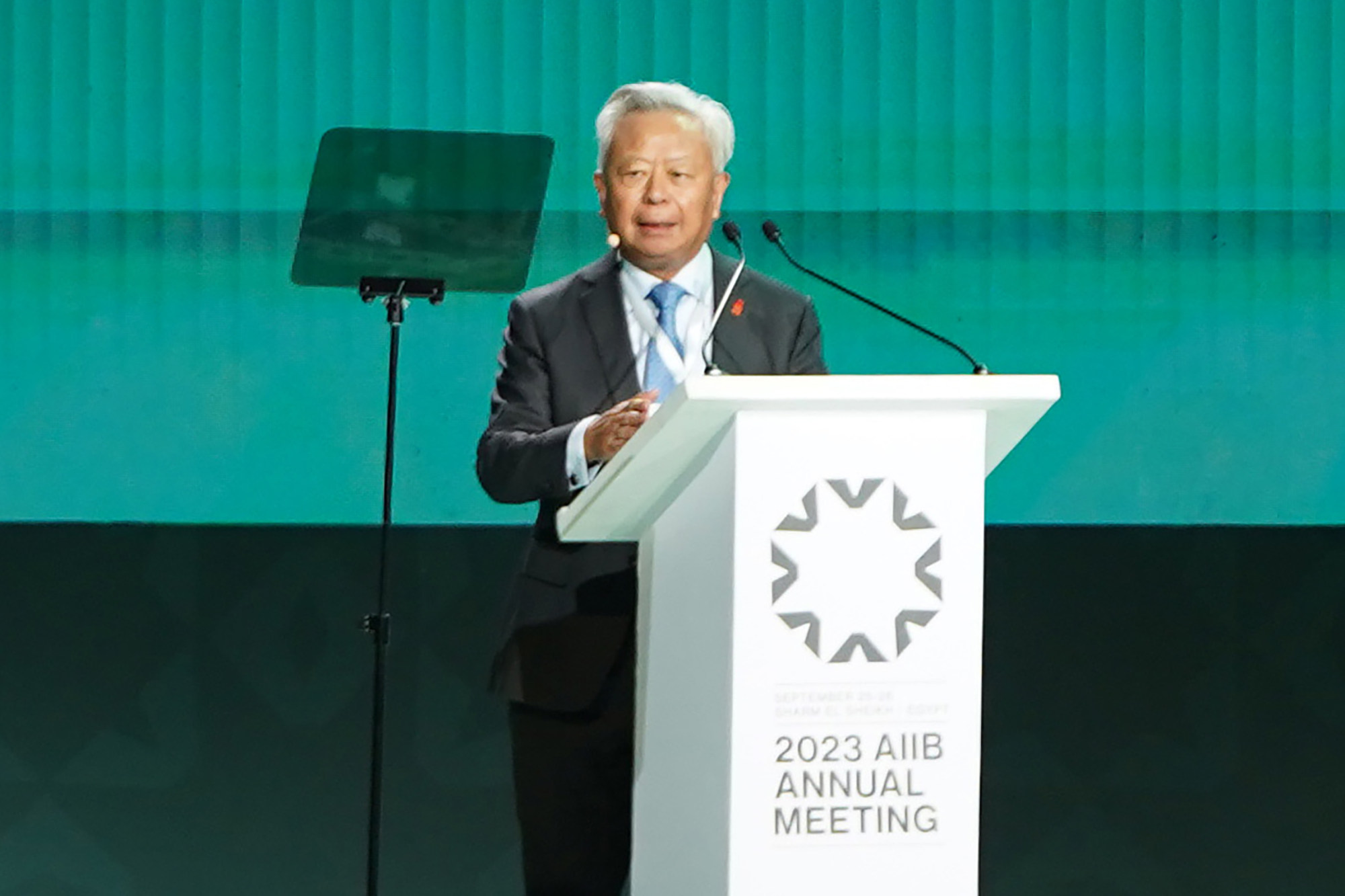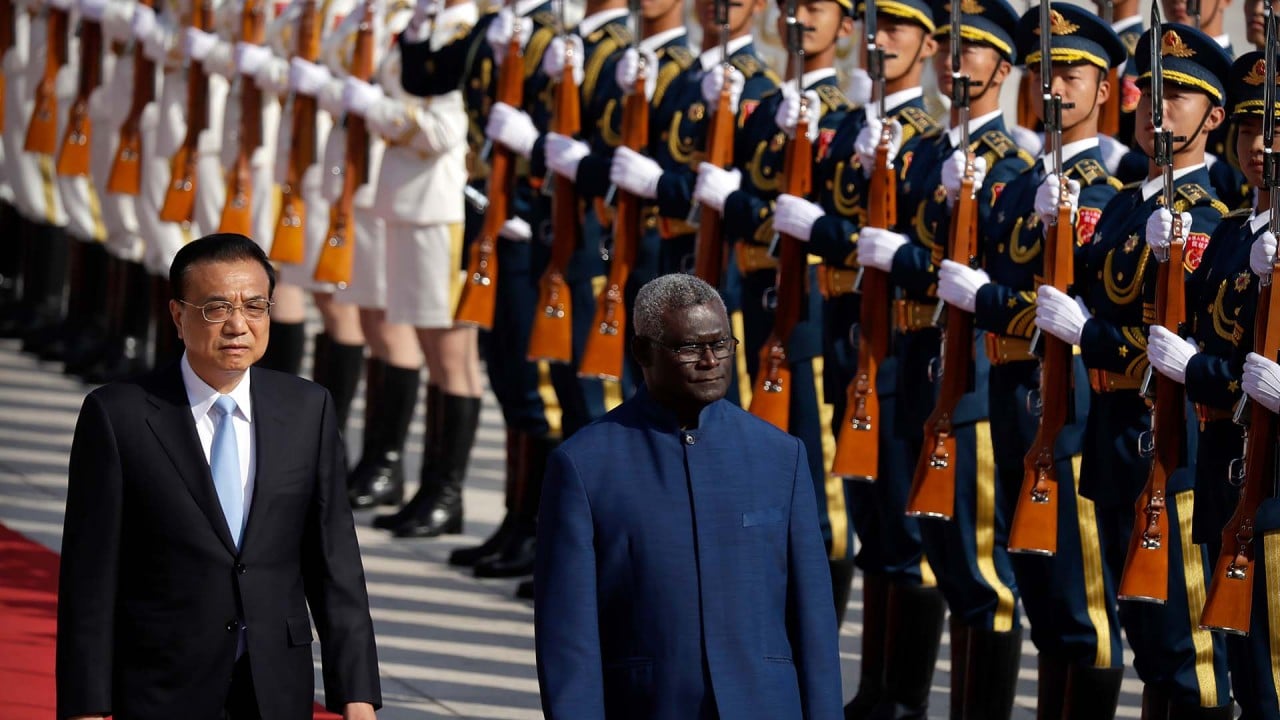Solomon Islands joins China-backed AIIB days after PM snubs Biden invite for Pacific summit at White House

[ad_1]
AIIB president and board chairman Jin Liqun said the members now “collectively account for 81 per cent of the world’s population and 65 per cent of global gross domestic product”.
“The addition of El Salvador, Solomon Islands and Tanzania strengthens the AIIB community and supports our collective mission to finance infrastructure for tomorrow,” Jin said.
“Together, we will work on priority projects within our clearly defined thematic priorities to drive long-term sustainable growth.”
The three prospective members will officially join the AIIB once they complete required domestic processes and deposit the first capital instalment with the bank.
“Our journey began with 57 founding members,” AIIB vice-president and corporate secretary Ludger Schuknecht said.
2 US House members visit Solomon Islands but prime minister is ‘unavailable’
2 US House members visit Solomon Islands but prime minister is ‘unavailable’
He said the growth in membership to 109 showed “that many believe in our mission to achieve sustainable infrastructure development and economic growth, as well as our commitment to actively support infrastructure projects that contribute to climate change mitigation, adaptation and resilience”.
China holds a 30 per cent stake in the bank, which started operating in 2016 as the brainchild of Chinese President Xi Jinping. It was billed as Asia’s answer to the World Bank to provide infrastructure finance for its members.
The bank said Pickard’s comments were “baseless and disappointing” while Beijing, through its foreign ministry, said the bank had “acted as a truly international, rule-based and high-standard institution”.
David Shinn, a China expert and professor at George Washington University’s Elliott School of International Affairs, said the three newest members hoped to obtain some of the infrastructure financing offered by the AIIB, which had a wide membership of countries representing various political persuasions.
“There is no significant downside to joining and the motivation is probably more practical than geopolitical,” Shinn said.

However, Aly-Khan Satchu, a geoeconomic analyst, said Solomon Islands had decisively pivoted towards the East, with Honiara recently describing development cooperation with China as “less restrictive, more responsive and aligned to our national needs”.
“Solomon Islands has made the geoeconomic calculation that a singular alignment with China at this time will have potentially an outsize pay-off, versus trying to balance the US and China, or pivoting towards the US. That signal is an overarching one and interesting for that,” Satchu said.
The Solomons’ top export to China is timber but it also sells products such as processed fruit and nuts and in return buys mostly iron products from China.
Last year, China signed a security deal with Solomon Islands allowing Sogavare to request China’s police and military officers, if required, to protect “Chinese personnel and major projects” in the Pacific nation.
The decision has raised concern in the US and Australia about Beijing’s growing interests in the region, where Washington is also making inroads.
In July, Sogavare accused the US of interfering in the Pacific nation’s “internal affairs” after Washington raised concerns about Honiara signing a security deal with Beijing.
In Central America, El Salvador, under President Nayib Bukele, has been thumbing its nose at Western financial architecture and probably feels the AIIB will be more receptive to its development needs, according to Satchu.
And Tanzania sought to straddle both sides – the US and China, with whom it has a long-standing relationship – but appeared to be seeking the potential for options.
“What all three countries affirm is China’s meaningful pull effect, and that a security partnership [which remains the US’ main offering] is one dimensional versus China’s more multidimensional offering,” Satchu added.
Sultan Al Jaber, president designate for the UN’s coming climate change conference, welcomed the AIIB’s pledge on Tuesday, saying “it is a crucial step in the right direction and is in line with the objectives of our COP28 presidency”.
“Bigger and better development banks, working together, are critical for closing the financing gap, especially when it comes to adaptation and operationalising the loss and damage fund,” Al Jaber said.
‘Outright lies’: China’s Ottawa embassy dismisses explosive AIIB claims
‘Outright lies’: China’s Ottawa embassy dismisses explosive AIIB claims
However, a report released by civil society groups on Tuesday said that in seven years the AIIB was yet to accept a single complaint from people adversely affected by its investments.
The study released by Recourse, Inclusive Development International and Accountability Counsel, said nearly half of all AIIB projects were found to be ineligible for the accountability mechanism. Of 219 projects funded by the end of June, 46 per cent (101 projects) were not eligible for consideration.
[ad_2]
Source link


